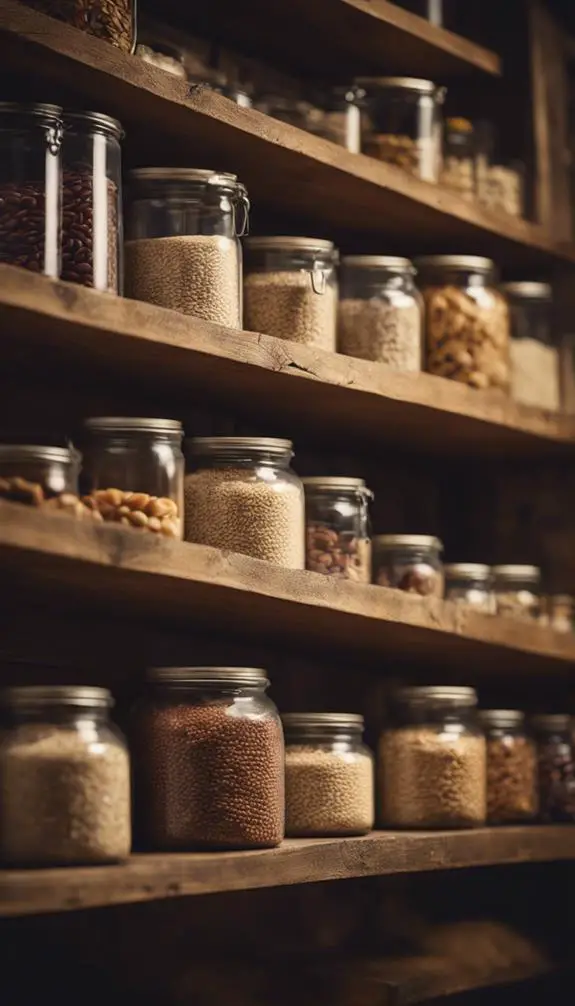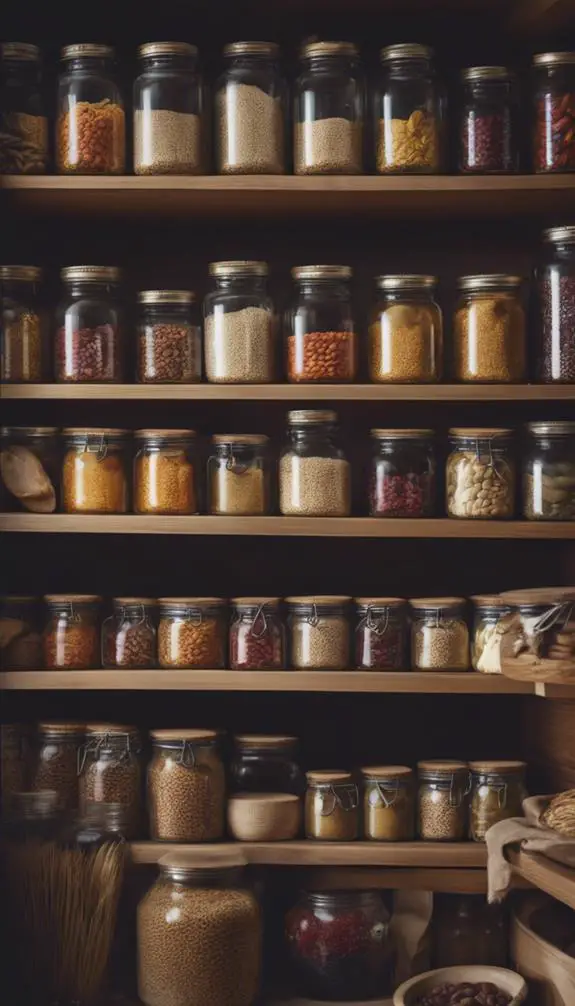When disaster strikes, having a well-stocked pantry can be a lifesaver. You'll want to focus on dry foods that are nutrient-dense, easy to store, and can be prepared with minimal resources. Whole grain pasta, rice, and oats are great starting points, but you'll also want to think about protein sources like nuts, seeds, and canned goods. And let's not forget about the importance of fiber and essential vitamins from dried fruits and veggies. You're probably wondering what else you should be stockpiling – and that's exactly what we'll explore next.
Summary
- Stockpile whole grain pasta, rice, and healthy oats for sustained energy, fiber, and essential nutrients in emergency situations.
- Nuts and seeds provide reliable protein sources, rich in nutrients, and are easy to store and consume.
- Canned meat, fish, beans, and legumes offer essential protein, fiber, and nutrients, and can be used in a variety of meals.
- Dried fruits and vegetables provide essential vitamins, minerals, and fiber, and can be stored for long periods due to low moisture content.
- Energy-dense granola, bars, and natural sweetener options like honey, maple syrup, and coconut sugar can be stockpiled for quick energy and nourishment.
Canned Goods for Long-Term Storage

When building a stockpile of dry foods, canned goods are an excellent starting point for long-term storage.
You'll want to focus on non-perishable items that are rich in nutrients and can be easily prepared. Look for cans with a long shelf life and avoid dented or rusted ones.
You must comprehend proper canning methods to guarantee food safety. Always check the expiration dates and store them in a cool, dry place.
Rotate your stock regularly to maintain freshness. Consider canning your own goods using safe and tested methods to guarantee a steady supply of healthy food.
Whole Grain Pasta and Rice

Beyond canned goods, whole grain pasta and rice are essential dry foods to stockpile for a well-rounded emergency supply.
You'll want to store various pasta varieties, such as spaghetti, macaroni, and linguine, to add diversity to your meals. Whole grain pasta provides sustained energy and fiber, making it an excellent choice for emergency rations.
Rice benefits include being a versatile base for meals, easy to prepare, and a good source of carbohydrates. Brown rice, in particular, is high in fiber and nutrients. Store both white and brown rice to cater to different tastes and dietary needs.
When stockpiling, guarantee you store these dry foods in airtight containers, away from moisture and pests, to maintain their shelf life.
Nuts and Seeds for Protein
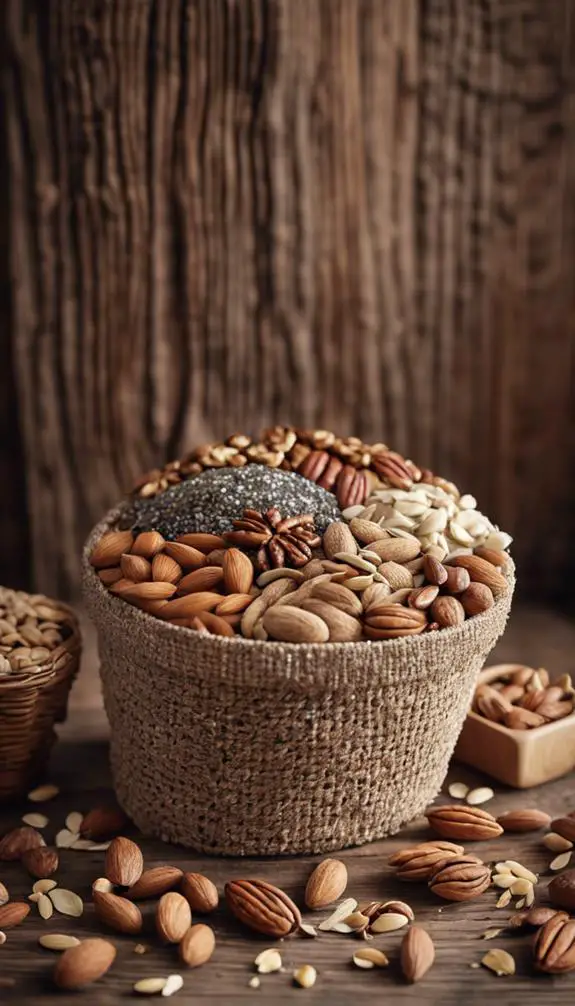
Your emergency pantry should include nuts and seeds as a reliable source of protein.
These compact foods are rich in nutrients, easy to store, and can be consumed as is or added to meals for extra protein.
Peanuts, for instance, are high in protein and healthy fats. When storing peanuts, keep them in a cool, dry place to maintain their quality.
Sunflower seeds, on the other hand, offer a good dose of vitamin E and selenium. They're also versatile and can be roasted or pressed for oil.
Consider stockpiling a variety of nuts and seeds to guarantee a steady supply of protein during an emergency.
Dried Fruits and Vegetables

You can rely on dried fruits and vegetables to provide essential vitamins, minerals, and fiber in your emergency pantry.
These nutrient-dense foods are perfect for long-term storage due to their low moisture content, making them resistant to spoilage.
When choosing dried fruits and vegetables, look for products that have been preserved using natural dehydrating methods, free from added sugars and preservatives.
Fruit preservation is vital, as it helps maintain the natural flavors and textures of the fruits.
Consider dehydrating your own fruits and vegetables to have full control over the process.
Energy-Dense Granola and Bars

In addition to dried fruits and vegetables, energy-dense granola and bars offer a convenient way to stockpile nutrients for emergency situations.
Debunking granola myths, you'll find that homemade granola can be a cost-effective and nutrient-rich addition to your stockpile. By making your own, you can control the ingredients and portion sizes.
Look for bar recipes that use wholesome ingredients like nuts, seeds, and dried fruits to create a compact and energy-dense snack. Store them in airtight containers to maintain freshness.
With a little creativity, you can create a stockpile of granola and bars that will provide you with the energy you need to stay focused and productive during an emergency.
Powdered Milk and Eggs

Occasionally, emergencies can leave you without access to refrigeration, making dairy and eggs a scarce commodity.
Powdered milk is a great alternative, allowing you to store milk for extended periods. When storing powdered milk, keep it in a cool, dry place, away from direct sunlight and moisture.
You can also use it to make cheese, yogurt, and butter.
Eggs are another essential item to stockpile. One effective egg preservation method is to dehydrate them.
Simply crack the eggs into a bowl, whisk, and pour into an ice cube tray. Freeze, then transfer to an airtight container or freezer bag for long-term storage.
With powdered milk and preserved eggs, you'll have a steady supply of essential nutrients during an emergency.
Canned Meat and Fish
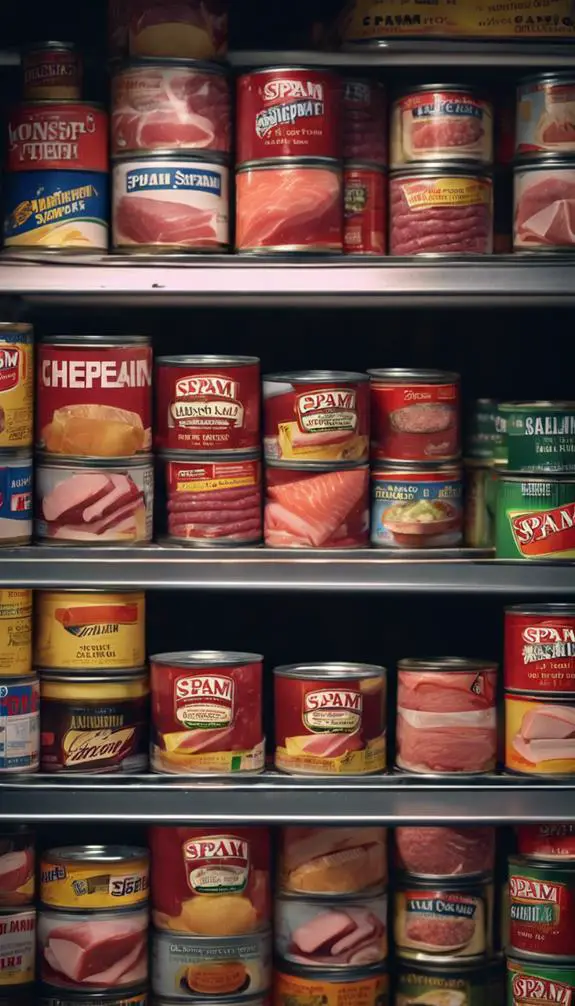
Three essentials in your stockpile should be canned tuna, salmon, and chicken.
These meat varieties and fish options provide essential protein to keep you going during an emergency. You can use them to make a variety of meals, from salads to soups, and even eat them straight out of the can.
Don't forget to include other canned meat and fish options like beef, pork, and sardines to add some diversity to your stockpile.
When selecting canned goods, look for low-sodium options and avoid expired or damaged cans.
With a well-stocked supply of canned meat and fish, you'll be prepared to feed yourself and your loved ones during uncertain times.
Beans and Legumes for Fiber
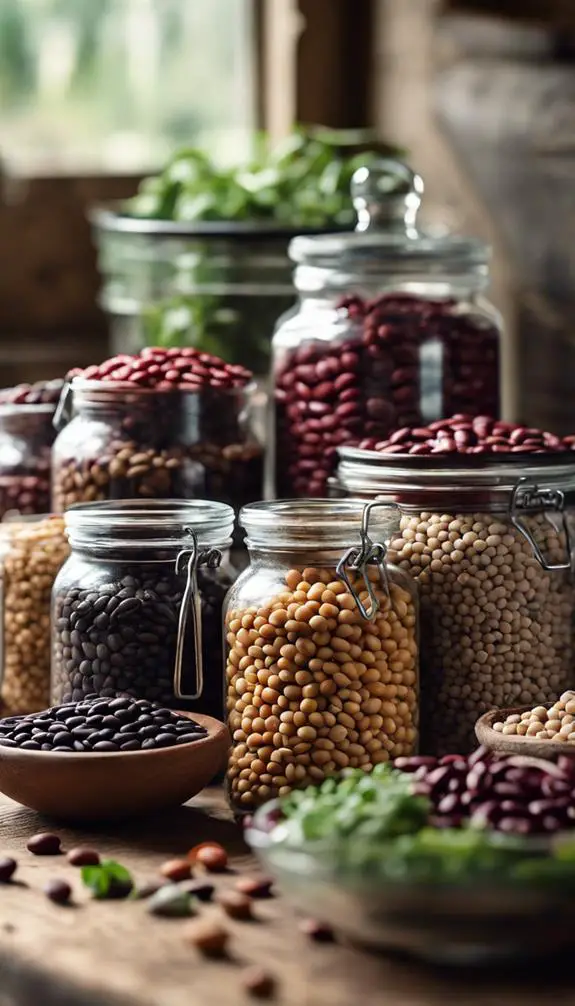
With protein sources covered, it's time to focus on fiber-rich foods that'll keep your digestive system running smoothly during an emergency.
Beans and legumes are a great addition to your stockpile, providing essential fiber benefits like regular bowel movements, healthy blood sugar levels, and even weight management.
When it comes to legume preparation, make sure to soak and cook them properly to eliminate phytic acid and make their nutrients bioavailable.
Stockpile a variety of beans and legumes like kidney beans, black beans, lentils, and chickpeas. They're easy to store, can be used in a variety of dishes, and will provide you with a steady supply of fiber during a crisis.
Healthy Oats and Grains

You'll frequently find healthy oats and grains in the pantries of preppers and survivalists, and for good reason.
These staples provide essential nutrients, fiber, and energy when you need them most. Oatmeal benefits include lowering cholesterol and controlling blood sugar levels, making it an excellent addition to your emergency stockpile.
Ancient grains like quinoa, amaranth, and Kamut offer a rich source of protein, vitamins, and minerals.
They're also easy to store and prepare, making them ideal for a crisis situation. By incorporating healthy oats and grains into your emergency food supply, you'll be well-equipped to face any challenge that comes your way.
Instant Coffee and Tea

You'll appreciate having instant coffee and tea on hand when you need a quick pick-me-up in a crisis situation.
These dry goods can be a lifesaver when you're unable to brew a fresh cup, allowing you to get a much-needed caffeine boost in a pinch.
In a survival scenario, instant coffee and tea can be a comforting reminder of normalcy, providing a brief respite from the stresses of the situation.
Brewing in a Pinch
Frequently, a hot cup of coffee or tea is just what you need to take the edge off a long day or provide a much-needed pick-me-up in an emergency situation.
When stockpiling instant coffee and tea, consider the brewing methods you'll need to use in a pinch. Look for lightweight, compact options that don't require electricity, like French press or pour-over brewers.
For coffee, choose a medium to dark roast, as they're more forgiving of imperfect brewing conditions. Tea options like black, green, or herbal are all good choices.
Remember to store your coffee and tea in airtight containers to preserve flavor and freshness. With these essentials on hand, you'll be able to brew a hot cup even in the most challenging circumstances.
Caffeine in a Crisis
In crisis situations, a reliable caffeine fix can be a lifeline, providing a much-needed energy boost to help you stay focused and alert.
You know you'll need it, so stockpiling instant coffee and tea is a no-brainer. Without it, you might face coffee withdrawal headaches and fatigue, making it harder to respond to the crisis at hand.
Don't underestimate the importance of crisis caffeine – it can be a game-changer when you're fighting to stay awake and alert.
Instant coffee and tea are lightweight, compact, and can be stored for years, making them perfect for your emergency stash.
Just be sure to store them in a cool, dry place to preserve their flavor and potency.
Ready-to-Eat Soups and Stews

What's more comforting during a crisis than a warm, nourishing bowl of soup or stew?
You'll want to stockpile a variety of ready-to-eat soups and stews that are easy to prepare and provide essential nutrients.
Consider soup varieties like Minestrone, Lentil, and Chicken Noodle, which are rich in protein, fiber, and vitamins.
Stew recipes like Beef Stew, Chili, and Vegetable Stew are also great options.
Look for brands that are low in sodium and added preservatives.
When selecting, make sure to choose products with a long shelf life and easy-to-follow instructions.
Having these comforting meals on hand will provide you with a sense of security and comfort during uncertain times.
Honey and Sugar Substitutes

You'll want to stockpile honey and sugar substitutes that won't spoil quickly, so it's crucial to ponder natural sweetener options like honey, maple syrup, and coconut sugar.
Alternative sugar sources like stevia, erythritol, and monk fruit sweetener are also great options. Since these sweeteners have a long shelf life, you can store them safely for extended periods without worrying about spoilage.
Natural Sweetener Options
Beyond the sugary staples, natural sweetener options abound for those seeking alternatives to refined sugars.
You'll find that coconut sugar, for instance, has a lower glycemic index than regular sugar, making it a better choice for those with dietary restrictions.
Date sweetener, on the other hand, is a natural sweetener made from dried dates, offering a sweet and caramel-like flavor.
Both options are great for baking, cooking, or just adding a touch of sweetness to your daily meals.
When stockpiling, consider storing these natural sweeteners in airtight containers to maintain their flavor and shelf life.
Alternative Sugar Sources
In the face of an emergency, having alternative sugar sources on hand can be a lifesaver, especially for those with a sweet tooth.
You'll want to stockpile honey, a natural preservative that's rich in antioxidants and has antibacterial properties. Honey can be used to sweeten food and drinks, and it can even be used to treat wounds.
In addition to honey, consider sugar substitutes like stevia, erythritol, and xylitol. These alternative sweeteners are low in calories and won't raise your blood sugar levels.
They're perfect for baking and cooking, and they can be used in place of sugar in most recipes. By having these alternative sugar sources on hand, you'll be prepared to satisfy your sweet tooth, even in the midst of an emergency.
Long Shelf Life
Honey and sugar substitutes boast an impressive shelf life, making them ideal for stockpiling.
You can store them for extended periods without worrying about spoilage. Honey, in particular, has an almost indefinite shelf life due to its low water content and acidic pH, making it difficult for bacteria and mold to grow.
Sugar substitutes like stevia and erythritol also have a long shelf life, typically ranging from 2 to 5 years.
To guarantee the longevity of your stockpile, store them in a cool, dry place, away from direct sunlight.
Conduct regular shelf life extension and longevity testing to certify the quality of your supplies.
Baking Essentials and Spices

You'll find that having a well-stocked pantry of baking essentials and spices is crucial when it comes to whipping up everything from sweet treats to savory meals.
When stockpiling, prioritize flour storage – consider airtight containers or Mylar bags to keep it fresh. Don't forget basic spice blends like salt, pepper, and oregano, as well as baking staples like sugar, baking powder, and baking soda.
These will allow you to create a variety of dishes, from bread to cakes to roasted vegetables. Additionally, consider adding specialty spices like cumin, paprika, and thyme to add depth to your meals.
With these essentials on hand, you'll be able to create nourishing meals even in emergency situations.
FAQs
How Long Do Dry Foods Typically Last in Storage?
You control how long your dry foods last in storage by managing food spoilage and storage conditions. Properly stored in airtight containers, in a cool, dry place, they can last for years, but poor conditions can spoil them quickly.
Can I Store Dry Foods in Plastic Bags or Containers?
When storing dry goods, you'll want to opt for air-tight containers or moisture-proof packaging to keep them fresh, as regular plastic bags or containers can let in air and moisture, reducing shelf life.
Are Dry Foods Still Nutritious After Long-Term Storage?
You're right to wonder if stored dry foods retain their nutritional value. Thankfully, when stored properly, nutrient retention remains high, and oxidation effects are minimal, ensuring you'll still get the nutrients you need when you need them most.
How Do I Rotate My Dry Food Stockpile Effectively?
To maintain a fresh stockpile, you'll want to implement effective food tracking and inventory management systems, ensuring you consume oldest items first, and regularly update your stock to avoid expired or spoiled goods.
Can I Use Dry Foods Beyond Their Expiration Dates?
You can use dry foods beyond their expiration dates, but prioritize Food Safety; check appearance, smell, and texture, as Shelf Life varies; consume oldest items first to maintain a fresh stockpile, ensuring your freedom to eat safely.
Conclusion
You've stocked your emergency pantry with the essentials: whole grain pasta and rice for sustained energy, nuts and seeds for protein, and dried fruits and vegetables for essential nutrients. Don't forget energy-dense granola and bars, instant coffee and tea, and ready-to-eat soups and stews. With honey and sugar substitutes, baking essentials, and spices, you'll be prepared to whip up a meal in no time. Now, you're ready to face any emergency with a well-stocked pantry that'll keep you and your loved ones nourished and safe.

